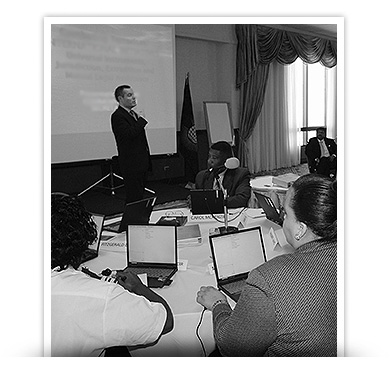 A real challenge for any organisation is how to get open, honest and constructive dialogue, particularly after a sensitive/critical event, such that the organisation can map the way forward in a meaningful way: anonymised debriefing is the solution.
A real challenge for any organisation is how to get open, honest and constructive dialogue, particularly after a sensitive/critical event, such that the organisation can map the way forward in a meaningful way: anonymised debriefing is the solution.
The need for honest and direct discussion is often the key to any successful corporate strategic or policy development, training programme or lesson-learning event.
As experienced facilitators we have often found that a few voices tend to dominate the discussion, while others will remain silent. This may occur for a host of reasons: hierarchical restraint, cultural restraint, lack of confidence or the absence of ‘buy-in’ by those affected.
Genuine and honest input and feedback is often not captured, leading to strategies, training programmes, policies & procedures being developed that never truly reflect the needs of the organisation or, worse, are not fit for purpose! We know that your staff are in the best position to identify your organisation’s strengths and vulnerabilities in order to avert a crisis and to implement lessons learned following a critical incident.
Solve:Interactive is a platform that allows for candid expression of views through its inbuilt ‘anonymised’ capability.
Solve:Interactive is regularly used for planning, pre-briefing and debriefing. In the pre-briefing phase, it works towards building consensus-based priorities, policies and procedures, and captures experiences, feedback and ideas in a manner that explores workable solutions. As a debriefing methodology, it is particularly valuable as it encourages ‘dialogue’ and allows individuals to ‘voice’ their ideas, opinions and concerns without inhibition and then to work constructively towards outcomes and resolution. The experience is often described as ‘cathartic’ by participants!
It is:
- User-friendly and straightforward for any participant with basic computer skills;
- Low-cost (with participants able to use their own devices);
- Designed to assist an organisation to achieve results;
- Entirely secure, with nothing downloaded onto individual devices;
- Web-based technology, capable of being utilised at a single location or remotely via several locations;
- Capable of being conducted in any language.
Application
Solve:Interactive can be used in any number of situations and is equally capable of being deployed by commercial bodies, organisations and institutions.
To date we have helped clients to:
- Acquire and collect candid feedback on organisational performance and values
- Conduct an initial scoping exercise to identify exact training needs
- Create new or assess existing policies and procedures
- Test internal organisations systems, procedures and policies
- Resource allocation and deployment
- Needs assessment/gap analysis
- Assess an organisation's responses following a critical incident
- Identify good practices and lessons learnt in the wake of a critical incident

Solve:Interactive can be used to review incidents candidly, plan effectively for future events, assess policies and procedures and to examine sensitive issues. For example:
- Following a real or simulated incident, participants might be asked to reflect and report on their experiences of how the critical incident was managed: to identify those key issues – both positive and negative – that contributed significantly to the outcome, or ‘what went wrong’.
- Employees and stakeholders can be asked for their anonymous feedback on a company’s policies and procedures: what is and/or is not working and what can be improved upon. This enables a very rounded and honest appraisal from all levels of the organisation, without fear of reprisal ‘outside of the classroom’.

Methodology:
Each participant is provided a laptop and, with the assistance of Amicus facilitators (the team may include subject-matter experts when required), is asked to ‘input’ their thoughts, views and opinions on a specific matter, topic or challenge to be pre – or debriefed.
Each contributor enters information, which is visible to all the participants, but retains complete anonymity.
Participants are free to comment on the views expressed and to add suggestions, as well as being able to put forward questions and ideas. The facilitators manage the exercise by viewing the discussion and developing further lines of discussion topics as necessary.
In this way, a large amount of specific and ‘honest’ commentary is captured and distilled enabling a company to identify its gaps and put in place the correct response.
Following every Solve:Interactive session, a detailed analysis report can be drawn-up and recommendations made.
Key Benefits
- Participants are able to ‘speak’ freely and candidly without departmental constraint;
- Organisations gain honest feedback to help reach the right solutions for it;
- Controversial, sensitive or ethical issues are more easily explored and discussed;
- Every participant has their ‘voice’ heard rather than a select few;
- Each participant is able to express him/herself fully;
- Topics can be raised and discussed openly;
- Issues of the greatest consequence and significance to participants can surface;
- The group dynamic helps create a focus on the most important and critical topics.
